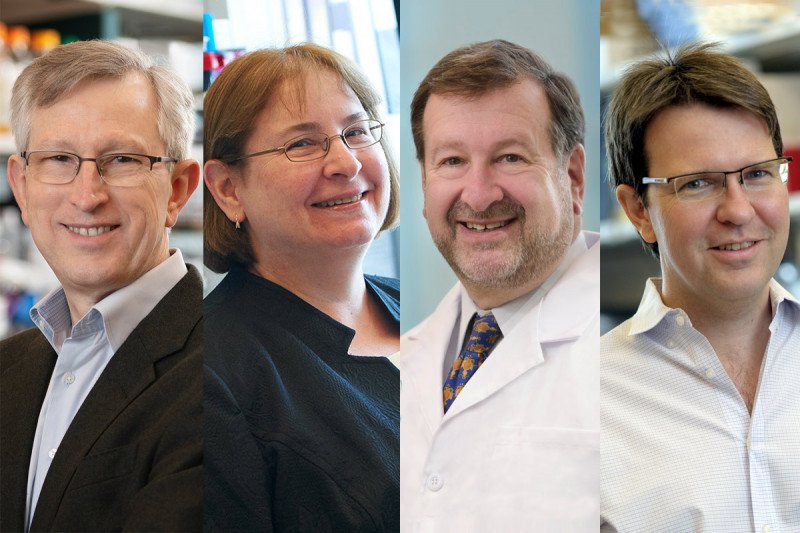
Joan Massagué, PhD; Maria Jasin, PhD; David A. Scheinberg, MD, PhD; and Hans-Guido Wendel, MD
Four distinguished researchers at Memorial Sloan Kettering (MSK), Joan Massagué, PhD; Maria Jasin, PhD; David A. Scheinberg, MD, PhD; and Hans-Guido Wendel, MD, were named recipients of the National Cancer Institute’s (NCI) 2020 Outstanding Investigator Award (OIA). As part of this exceptional award, the NCI will provide each investigator with up to $600,000 per year for seven years to support their research in cancer.
“We are deeply honored to receive the NCI’s 2020 Outstanding Investigator Award, which will assist in our efforts to advance research and treatment in the field of cancer. In addition, four out of 15 recipients nationwide are from MSK. This is a remarkable success,” said Dr. Massagué, Director of Sloan Kettering Institute (SKI).
The NCI’s OIA supports investigators and accomplished leaders in cancer research who have been nominated by their respective institutions and are providing significant contributions in the field of cancer and developing treatments as well as tools that may lead to breakthroughs in biomedical, behavioral, or clinical cancer research.
“The NCI Outstanding Investigator Award addresses a problem that many cancer researchers experience: finding a balance between focusing on their science while ensuring that they will have funds to continue their research in the future,” said NCI Deputy Director Dinah Singer, PhD. “With an anticipated seven years of uninterrupted funding, NCI is supporting the opportunity for investigators to fully develop exceptional and ambitious cancer research programs.”
Dr. Massagué is Director of SKI, Marie-Josée and Henry Kravis Foundation Chair, and Member of the Cancer Biology & Genetics Program. He and his lab members investigate metastatic stem cells and their stromal niches as well as the role of immune regulatory and regenerative signals in cancer relapse. A special interest of theirs is transforming growth factor beta (TGFβ), a major regulator of cell phenotype during development, tissue homeostasis, regeneration, and cancer. The long-term goal of Dr. Massagué and his lab is to explain the role TGFβ plays in tumor progression, dormant metastasis, immunotherapy resistance, and how and when to target TGFβ in cancer.
Dr. Jasin is a Member of SKI’s Developmental Biology Program. She and her lab members are investigating homology-directed repair (HDR), a major pathway for the repair of DNA double-strand breaks and other lesions. This research includes how HDR proteins act to maintain genomic stability and cell and tissue homeostasis, with a focus on breast cancer gene 2 (BRCA 2); how HDR proteins come to be “lost” in cells; and how HDR function can be restored, which sheds light on our understanding of tumor initiation, therapy response, and therapy resistance.
Dr. Scheinberg is Chair of the Molecular Pharmacology Program at SKI, Director of the Experimental Therapeutics Center, and Vincent Astor Chair. Since 1986, Dr. Scheinberg and his lab have investigated and distinguished the features of cancer cells compared with healthy cells and developed safe and selective innovative immunotherapies ranging from humanized antibodies, T-cell receptor mimic antibodies, cancer vaccines, and alpha-emitting antibodies. Building off of this research, Dr. Scheinberg’s lab will conduct innovative research to exploit the immune response to cancer specific targets.
Dr. Wendel is a Member/Professor of the Cancer Biology & Genetics Program. Dr. Wendel was recognized for his research on follicular lymphoma (FL), the second most common form of B cell lymphoma, and how the disruption of the FL microenvironment is effective against the disease. He and his lab team have succeeded in engineering bi-functional antibodies and modifying chimeric antigen receptor T cells (CAR T cells) that target interactions between B cells and supportive microenvironments.



